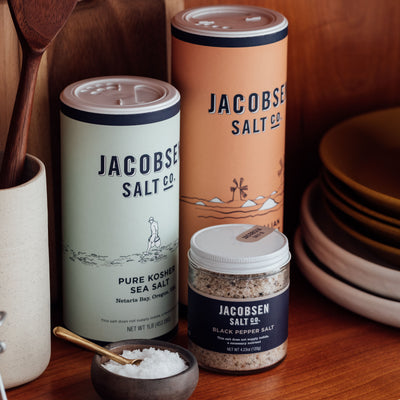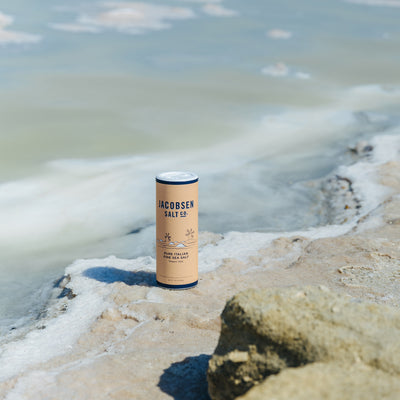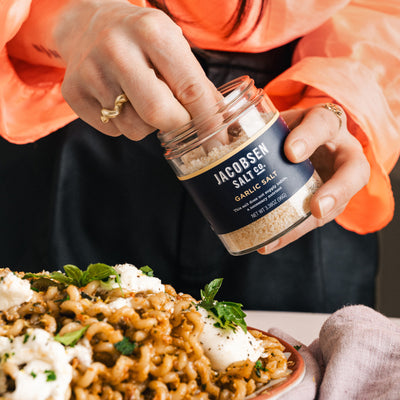

9-Course Spiel: Wonderfolk
Posted by:
Jacobsen Salt Co.
Posted on:
Apr 21, 2023

Learn more about our hive program community partner, Wonderfolk, and their mission to develop diverse young leaders through opportunities that amplify their agency, impact their community, and shape their future.
Founded in 2015, Wonderfolk is a youth-leadership development organization that provides accelerated leadership development through travel and local civic engagement experience aimed at addressing the opportunity gap for BIPOC teenagers and their communities. For the last two years, the Jacobsen Co. Hive Program has partnered with the organization as a part of Wonderfolk’s Our Naturehood program, inviting student fellows to partake in a two-part series about beekeeping, honeybees and habitat restoration within the PDX community. Aimed at introducing the cohort to beekeeping from a 360-degree perspective, it begins with a springtime hive site visit focused on pollinator habitat and the innerworkings of a healthy hive and culminates in a late-summer lesson in honey harvesting. Wonderfolk’s 2021 cohort was the first group we ever hosted at our Portland Riverfront Apiary and we’re excited to be entering into our third season working together.
To celebrate the second harvest of our Portland Riverfront Honey and the apiary that nurtured it, we will be donating all profits from this honey to Wonderfolk’s efforts. Read below to learn from Executive Director, Mark Bennett, and Program Coordinator, Diana Tuz, about the organization and how you can support:
1. Can you tell us about Wonderfolk and the mission of the organization?
The mission of Wonderfolk is to develop diverse young leaders and give them access to unique leadership opportunities that amplify their agency, impact their community and shape their future.
Our vision is one of unlimited opportunity for youth. We bridge opportunity gaps by opening access for diverse students to step into new spaces and opportunities, and learn they can thrive. We reiterate that there is strength in their identity, perspective and lived experiences that gives them the ability to succeed in spaces where they have found barriers to access, or lack of representation.
2. How was Wonderfolk started? What was the inspiration behind starting the organization?
Wonderfolk began as Global Works Community Fund, which was started in response to many diverse and lower-income youth finding barriers to participate in service-learning summer study abroad programs. I (Mark) inherited the organization from the founder, Polly Moriarty, after having led many summer high school programs with our partner, Global Works Travel, and recognizing the disparity. I worked in a Title-1 school at the time with diverse, lower-income youth who were powerful and hungry for opportunity but didn’t have access or know-how to access them. We built the organization around service-learning international travel, but recognized the need for deeper local connection and opportunity, so we built out the three areas of impact our programming operates within–Our Naturehood, Unity Through Arts, and Global Leadership. While programming has expanded, the heart of the organization remains the same–that access to opportunities–especially those that take you out of your comfort zone–build resilient, confident young leaders.

3. Can you give us an overview of what student fellows do during their time with Wonderfolk?
During our programming our students focus on our three pillars, Our Naturehood, Unity Through Arts and Global Leadership. We focus on creating connections between the students and their communities and expanding their leadership skills. We usually have about 32 hours of mentor meetings, 56 hours of local service work and 35 hours of service work abroad.
We begin recruiting in September, and after a rigorous application and interview process, we accept our cohort of students; this year we have 17. We work with them from February to October, building a community around inclusivity, identity and lived experience. We get deep quickly. As we navigate community-based projects–from arts to outdoors, ecology to two weeks in Costa Rica–our students build a family around shared experiences and support. Our students then support us in our events, recruitment efforts and are invited to return for a second year as a cohort of alumni mentors to be supports for the next year’s cohort.
4. What are the community and advocacy projects students focus on?
Our projects all fall under the three areas of impact we operate in: Global Leadership, Unity Through Arts and Our Naturehood. All of our students participate together in all programming, so they get to try on lots of new opportunities.
Global Leadership is our flagship pillar, which sends our students abroad to Costa Rica for two weeks in the summer to participate in service-learning projects with local communities, ecological reserves and farms. They learn to rely on themselves and each other, while building a new international community as they navigate a new country and culture without the resources from home they’re used to.
Our Naturehood revolves around equitable access to clean air, water and green spaces, and climate and ecology advocacy. We work with Jacobsen Salt, Oregon Wild and Forest Park Conservancy to create workshops and projects that support their missions, while exposing our youth to new spaces and ways to advocate for them.
Projects with Unity Through Arts explore how art and media allows you to control narratives and express perspective and experience. Through murals with diverse artists like Salomée Souag, personal projects with Tristan Irving and Auzurea Caples, and media/film/documentary projects with MetroEast Media, our students explore a multitude of ways to share their experiences and perspectives.
All of our projects are designed to spark independence, self-reliance and growth–as so often happens when you step away from what you know and into spaces unknown.
5. With it being Earth Week, can you tell us more about the Our Naturehood pillar?
The Our Naturehood pillar focuses on building a relationship with the natural world. We believe that all communities should have access to clean air, water and green spaces. Our students work on several community projects throughout the year from learning about how wildfires impact the ecosystem, to learning about the role bees play in our environment and writing letters to their elected officials on ways to protect green spaces in Oregon. We’ve been partnering with the Jacobsen Co. Hive Program for the last couple of years. During the first session our students learn how intricate the bee world is and how different flowers in pollination create different colors of honey. During the next session our students learn how to manually extract the honey and use a honeycomb spinner to put the honey into jars that they get to take home! With Oregon Wild, we hike in ancient forests or burned wilderness and learn about the importance of natural areas and how we can advocate for them to our elected officials. With FPC, we explore the beauty and ecological importance of Forest Park and support with invasive species removal and trail maintenance.

6. Why the name Wonderfolk? What does that mean?
Wonderfolk speaks to the creativity, curiosity and, of course, wonder that our students embody. It’s an inclusive name that celebrates them and their authentic selves as they expand their horizons and growth. Our logo is also a paper airplane, which embodies the movement and trajectory that our students take. Like a paper airplane, we’re always moving forward, just not always in a linear fashion.
7. What's your favorite part of your job?
Diana: My favorite part of my job is seeing how our students take what they learn and run with it! They are great at leading discussions but it doesn’t stop there, they organize, plan and TAKE ACTION on community and global issues. Our students come from low-income, first generation households. They already have so many other things that they are focused on, having food on the table, translating for parents, taking care of younger siblings but they give this program 110% because they know that they will have the support and guidance they need even after the program is done. They learn a lot from us but we learn so much from them. These kids will really change the world.
Mark: There is no other organization like Wonderfolk in Portland - or Oregon - as far as I know. This means the opportunities our students are exposed to are unlike anything they’ve done before, and their energy matches. Our students are unbelievable young people. We learn so much together as we explore big conversations about identity, lived experiences, goals for the community, and for ourselves. Learning with our group, as they navigate these new spaces, is certainly my favorite part of the job.
8. How can people get involved with or support the work you all are doing?
We’re always looking to build our community in a variety of ways:
- Through programmatic partnerships that fit within our three pillars
- Volunteer professional support for organizational health and growth–strategy, development, HR, communications or financial.
- Contributions through in-kind resources or financial support
- Volunteers to support programming and events (or other).
- Spread the word! Who do you know who can resonate with our goals or programming? We want to hear from you.
9. What have you learned about bees during the last two years that has stuck with you?
Diana: Something that stuck with me was about the queen bee and how the pheromones she produces control the behavior of the other bees. I just thought it was really cool that her scent has so much power.
Visit www.wonderfolk.org to learn more.












